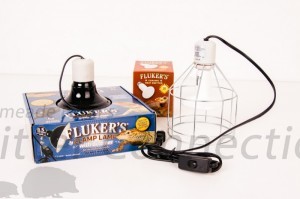Last Updated on October 19, 2022.

Thermo-Sensitive
- Hedgehogs are very sensitive to temperatures when compared to dogs or cats.
- They do not cope well with sudden changes in temperature.
- We have found that warm room temperatures are better than cool room temperatures.
- Hedgehogs that get too cool can go into a false or light hibernation, which can be deadly.
- Hedgehogs that are too cool can become torpid, lethargic, and will start to lose interest in food.
- Aestivation is a short hibernation that occurs when temperatures are too hot.
- Both hibernation and aestivation are not normal or healthy for pet hedgehogs.
Optimal Temperature
- Keep your hedgehog out of drafts and in a warm and well-lit location, but not in direct sunlight.
- Various books and online care information will suggest temperatures ranging from 65°F to 80°F as the preferred temperature.
- Our hedgehogs are accustomed to temperatures around 80°F. We prefer our animal room to stay between 75°F and 85°F.
- You should shoot for a higher temperature if the temperature is going to fluctuate so that the lower temperature is still within the recommended range.
- Lower temperatures lead to eating less and lower activity, and that makes the animal more susceptible to respiratory and other opportunistic infections.
- Temperatures below 65°F can induce torpor that can be very dangerous to your pet. Pet hedgehogs have been known to die at sudden drops of temperatures this low.
- Other hedgehog owners may suggest cooler temperatures, but we have found that our hedgehogs are healthier, happier, and more active at warmer temperatures.
- Even in states that are known to be more consistently warm such as Florida, a hedgehog still needs a heating element. Possibly even more so since its owner may have the A/C often running!
- A sign that your hedgehog is too hot is that it is spread out with its nose pointed upward and is panting. Its skin will also appear to be flushed.
- Do not place your hedgehog cage on a radiator or on direct heat. They need to be able to get away from heat if they get too warm. Overheating may cause serious health problems that can be fatal.
The Necessity of Heat
- Many stores sell a thermometer that records the high and low temperatures for a given period of time. This device is helpful to ensure that the temperature doesn’t get too high or too low without your knowledge.
- No matter what heating device you choose, you want to make sure your hedgehog stays warm. Some people find this is a bigger problem in the summer with air-conditioning than in the winter months.
- When hedgehogs get too cold, they are likely to try to go into a form of hibernation/aestivation. Hedgehogs will not eat and they become less active which can be very dangerous for your pet.
- Once a hedgehog has attempted hibernation, it is more likely to have the problem again in the future
- The more constant the temperature, the more beneficial for your hedgehog.
- All direct heat should be applied only to a portion of the cage. This can allow the hedgehog to move to a cooler part of the cage if it gets too hot.
- In case of a power outage, you should have a back up plan as to how you can keep your hedgehog warm.
Contributors: Gail Smith, Melissa Ramos
SHOP FOR HEATING / TEMPERATURE CONTROL ITEMS HERE!
VIDEO.: Choosing a thermometer for your hedgehog cage





